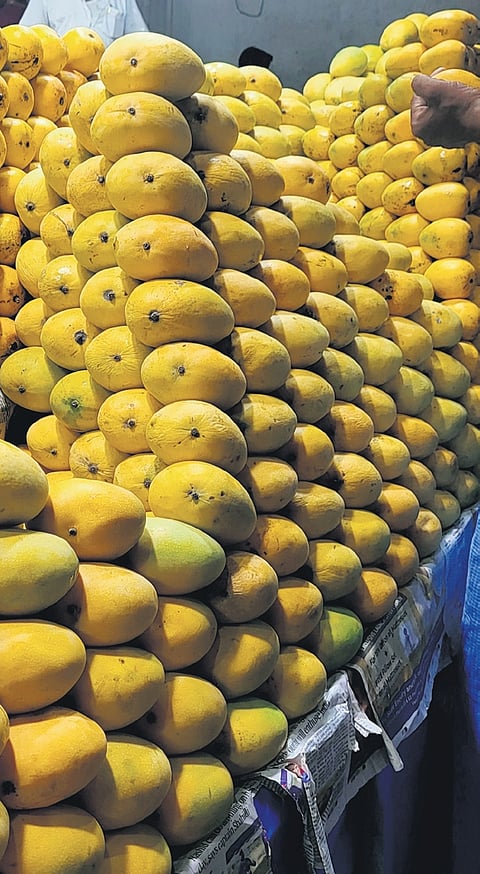

CHENNAI: Mangoes, often hailed as the “king of fruits”, are a tropical delight cherished for their exquisite taste, vibrant colours, and rich nutritional profile. Believed to have originated in South Asia, mangoes have a long history dating back thousands of years, where they were revered not only for their delicious flavour but also for their cultural significance. Today, mangoes are enjoyed worldwide and are cultivated in various tropical and subtropical regions, bringing joy to millions with their juicy sweetness and versatile culinary applications.
The mango fruit is of great economic value worldwide and of great nutritional importance. Its functional effects are due to numerous important nutrients and bioactive compounds. Mango is a climacteric fruit, capable of developing characteristic ripening-associated changes such as colour, aroma, and taste, before or after harvest
The very diverse phytochemical components in mango fruit can be classified into several groups including macronutrients such as carbohydrates (sugars, pectin, and cellulose), proteins, lipids (Ω-3 and Ω-6 fatty acids); micronutrients such as vitamins A and C, minerals, pigments (chlorophylls, carotenoids, and anthocyanins, depending on the cultivar), phenolic compounds (phenolic acids and flavonoids), and volatile compounds.
Some of the main bioactive compounds identified in mango fruit include phenolic acids (coumaric acid, ferulic acid and hydroxybenzoic acid), polyphenols (quercetin, mangiferin, catechins, tannins, kaempferol, anthocyanins, gallic acid, ellagic acid), carotenoids, which are the most abundant, and the vitamins ascorbic acid, thiamine, riboflavin, and niacin. These compounds have been reported to exhibit antioxidant activity and contribute to the prevention of cancer, diabetes mellitus (DM), and cardiovascular disease and inflammatory processes.
Mango fruit is rich in nutrients such as carbohydrates, fatty acids, vitamins, and minerals as well as non-nutrient compounds including organic acids, dietary fibre, polyphenols, carotenoids, and other pigments.
Nutrients
Energy: The energy value of mango fruit pulp varies from 60 to 190 kcal per 100 g
Carbohydrates: Ripe mango fruits are rich in sugars (glucose, fructose, sucrose), starch, pectin, and cellulose. The ripe mango fruit pulp is about 15% soluble sugars, which contribute to the sweet flavour and the structure of the fruit. Simple sugars favour obesity and obesity-related diseases, hence, the high intake of particular types of mangoes is not advisable for certain age groups therefore, the high-level intake of particular forms of mango is not advisable in certain age groups such as children because several studies have demonstrated the pro-obesity effects as it can increase hepatic and circulatory triglyceride as well as low-density lipoprotein levels.
Minerals: Mango fruit provides calcium, copper, iron, magnesium, manganese, phosphorus, potassium, selenium, sodium, and zinc to the human diet. Mango seeds and peels also contain significant amounts, in descending order, of calcium, potassium, magnesium, sodium, iron, manganese, zinc, and copper.
Protein: The protein content of mango fruit is low, ranging between 0.5 and 5.5% depending on the cultivar and several other physiological and cultural factors. Alanine, arginine, glycine, isoleucine, leucine, and serine were the predominant amino acids found in fully ripe mango fruit, with all other amino acids present in only trace amounts.
Vitamins: Changes in vitamin C content during mango ripening include higher levels in partially ripe mango fruit than in fully ripe mangoes. Mango fruit contains provitamin A carotenoids such as alpha-carotene and beta-carotene. The contents of vitamins E and K in mango fruit are low or moderate, while vitamin D is absent in this fruit. B vitamins in the fruit include B1 (thiamin), B2 (riboflavin), B3 (niacin), B5 (pantothenic acid), B6 (pyridoxine, pyridoxal, and pyridoxamine), and B9 (folate or folic acid).
Incorporating mangoes into a balanced diet can contribute to overall health and well-being. However, like any food, it’s essential to consume them in moderation as part of a varied diet to reap their nutritional benefits without overloading on sugars or calories.
Sadhvika Srinivas
@sadhvikaaa (dietitiansadhvika@gmail.com)
(Sadhvika is a clinical nutritionist who attends to metabolic disorders. She also works towards sports nutrition.)